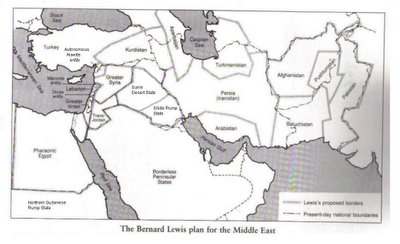
I just finished reading Bernard Lewis's much acclaimed History of The Middle East. The reason I read it is rather interesting; because Bernard Lewis is a name quoted so often in discussions pertaining to the Middle East especially by some big wigs in the field. In addition, this is also the prescribed text in many of the Ivy League schools such as Princeton and Yale. Given my interest in the region, and my curiosity about both the author and the book, after the winter break, despite the other work related readings I had to do, I mustered the courage to begin reading this text.
The first few chapters were quite interesting because they provided a compact history of the Middle East before Islam took it over. It was interesting to see how Christianity was weaned out of the region.
Half way through the book I realized that my interest was waning because of the detailed history of the emergence of the Shia and Sunni sects in Islam. But I held on until I came to the part where 'voila' oil comes into the picture and the Middle East becomes the center stage for a world political drama.
An informative text that would be of interest to anyone that wishes to better understand the current Middle East situation; to see it in its historical context.
Bernard Lewis in one of his interviews had the following to say about the current situation in Iraq, "Democracy is a strong medicine, which you have to give to the patient in small, gradually increasing doses. If you give too much too quickly, you kill the patient. ....I'm not sure a federal constitution will work in Iraq. It's too sophisticated at this stage. Relaxation of authority has to come gradually. You can't create a functioning democracy overnight."
Apparently, Mr. Lewis has high hopes for Iraq because its cultural and intellectual standards have "miraculously, if precariously, survived his ( Saddam's) ravages." Lewis also pointed out that the status of women is high in Iraq, and that is reassuring because as mothers they have tremendous impact on the next generation, and it makes "a great deal of difference to have an educated mother." But Lewis's main reason for optimism is that "Iraqis have gone through everything, and are much less likely to be taken in by the fanatical groups in the region". Will America's greatest guru's words come true?
8 comments:
This one's been on my reading list for a while. Now, with the whole cartoon bruhaha, I probably actually should read it.
Is it a dry read?
"status of women is high in Iraq"- it always was even during Saddam's regime...In fact women are given freedom in Iraq like nowhere else in the MiddleEast. But the main point is whether the Sunnis and Shias can work together for a future in Iraq? BTW your analysis on the the movie doing good at the Oscars in you earlier post was spot on. Cheers.
pacze moj,
It definitely isn't racy, but I wouldn't term it dry either. There are a few chapters in the middle that were a trifle too technical for a generalist reader like me, but other than that I got through it pretty fast.
bablu,
Thanks. Indeed, Brokeback Mountain did break many a (movie) back to have made it there. Let's see how many awards it finally bags.
Ayesha,
You are right about Bernard Lewis's writings creating many a divide; not only between 'Islam and the rest', but at a significantly smaller scale among eminent academicians of History in the USA.
In his recent writings, Lewis admits to and documents a growing chasm between Islamic countries and the United States, but it's not a vision without hope. To quote from a 2005 article Freedom and Justice in the Modern Middle East:
"Equality among believers was a basic principle of Islam from its foundation in the seventh century, in marked contrast to both the caste system of India to the east and the privileged aristocracies of the Christian world to the west. Islam really did insist on equality and achieved a high measure of success in enforcing it.........
The record would seem to indicate that as late as the nineteenth or even the early twentieth century, a poor man of humble origins had a better chance of rising to the top in the Muslim Middle East than anywhere in Christendom, including post-revolutionary France and the United States....
The creation of a democratic political and social order in Iraq or elsewhere in the Middle East will not be easy. But it is possible, and there are increasing signs that it has already begun."
My list of books to read is getting longer and longer. I hope I can find the time to get to them all. Thanks for another find.
I totally subscribe to your ideas on Anonymous blogging. Thanks.
Bernard Lewis. Absolute genius when it comes to interpreting islam. Just read his "What went wrong?" on 9/11.Reading ur thoughts, i guess "History of The Middle East" should be next.
Post a Comment